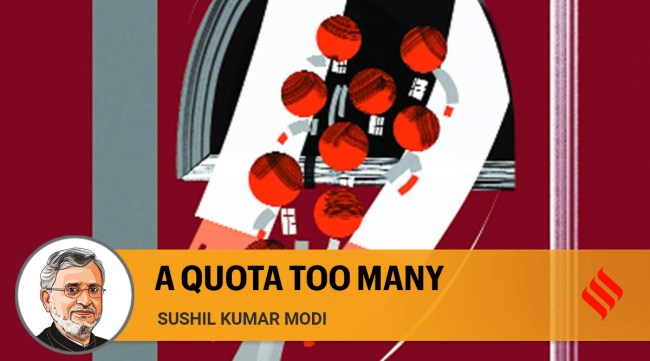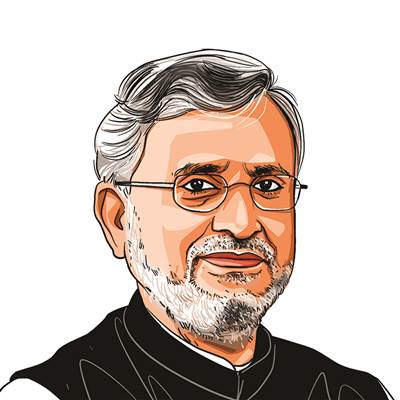Opinion MP quota for Kendriya Vidyalaya admissions must go
It undermines the quality of education, goes against constitutional provisions
 The number of students an MP could recommend for admission was increased from two to five in 2011, after the quota was restored a second time in 2010.
(Illustration by C R Sasikumar)
The number of students an MP could recommend for admission was increased from two to five in 2011, after the quota was restored a second time in 2010.
(Illustration by C R Sasikumar) There are very few issues on which legislative and judicial positions have wavered with such frequency over the years as the Special Dispensation Scheme for admissions in the Kendriya Vidyalayas (KVs). Introduced in 1975, the scheme has been in constant flux as a result of the frequent changes in the standpoints of the KV’s board of governors, its joint action committees, the law ministry and the human resource development ministry. The measure was abolished thrice, but on each occasion it was reintroduced. That a discretionary provision has witnessed so many changes — the latest amendment to it was as recently as 2016-17 — speaks of its inherently flawed nature.
Currently, the scheme allows every MP to recommend 10 students for admission to the Kendriya Vidyalayas. The scheme was reintroduced in 1998 after its first withdrawal in 1997. It was scrapped on two more occasions, including once at the instance of the Delhi High Court just after it was re-introduced in 1998. The number of students an MP could recommend for admission was increased from two to five in 2011, after the quota was restored a second time in 2010. This was further increased to six in 2012 and then to 10 students per MP in 2016.
Given that there are 543 MPs in the Lok Sabha and 245 MPs in the Rajya Sabha, a total of 7,880 admissions are executed through this quota every academic year. Since the scheme facilitates admissions over and above the class strength of the KVs, it distorts the student-teacher ratio in these schools. It’s well-known that maintaining a healthy pupil-teacher ratio, especially at the foundational levels, is critical to ensure desired learning objectives. This has been reiterated by the New Education Policy 2020 which recommends a student-teacher ratio below 30:1 for schools. The policy sets an aspirational target of below 25:1 in areas with large numbers of socio-economically disadvantaged students. The MP quota hinders these objectives as it dilutes educational standards in the KVs.
The MP quota is an anachronism in today’s India and must be dispensed with at the earliest. Initially conceptualised as a means of enhancing democracy by providing discretionary power to MPs, the quota has served little purpose to that end. Such a discretionary provision in admission practices discounts quality and goes against the spirit of transparency, consistency, and meritocracy.
A discretion accorded to an elected representative is based on the premise that the people trust the politician to ensure its best use. An MP is approached by people several times more than the quota allotted to him/her. Evaluating each proposal to determine the most deserving and meritorious ones is practically unfeasible. The use of this power is, therefore, prone to arbitrariness. The 7,880 seats under the MP quota could have served a better purpose if they had been allotted to meritorious students in a transparent manner.
Moreover, even after selecting 10 students as per the limit, an MP is forced to turn down a large number of applicants. This provokes public anger in the constituency as a number of people get rejected without a rational justification. As evinced by the experiences of many fellow parliamentarians, this quota has become an unpopular power with MPs, one which has overstayed its welcome.
Allotment of seats under the MP quota is also an inconsistent practice if one looks at the other central educational institutions of the country. MPs are not given such discretionary quotas in the Jawahar Navodaya Vidyalayas or for that matter other central educational institutes in the country. It goes against reason to have such a provision exclusively for Kendriya Vidyalayas, especially because parliamentarians have not been provided with any jurisdiction in recommending admission of students in other educational institutions.
With its flagrant disregard for reservation limits, this quota also undermines a constitutional provision. Admissions through it fail to maintain fidelity to the constitutionally-mandated 50 per cent reservation criteria for the SCs, STs and OBCs. It also deprives the economically weaker sections of the right to 10 per cent reservation and ignores the right of the differently-abled students to 3 per cent horizontal reservation.
Bereft of any allegiance towards reservation policies in the country, this quota has been depriving about 3,940 students of their constitutional right every year. As a result, it has undermined one of the principal reasons for establishing KVs: Giving admission to students from marginalised communities and disadvantaged sections. Abolishing it will be a welcome step towards respecting constitutional provisions and fulfilling the mandate of the KVs.
As our democracy has matured, we have done away with several discretionary powers given to political figures: These include scrapping the practice of allotting gas pumps and revoking the appointments and nomination powers of various ministers as recommended by the Group of Ministers in 2011. Even the Union education minister’s discretionary quota for admissions was scrapped recently. Admissions through this quota had surged a staggering 27 times from 450 to 12,295 in 2020-21 until the Union Education Minister surrendered this quota. No admission under the minister’s discretionary quota has taken place since then.
In view of these developments, it would therefore be proper to abolish the MP’s discretionary quota under the Special Dispensation Admissions Scheme, this time for good.
This column first appeared in the print edition on March 24, 2022 under the title ‘A quota too many’. The writer, a former Deputy CM, Bihar, is a Rajya Sabha MP




